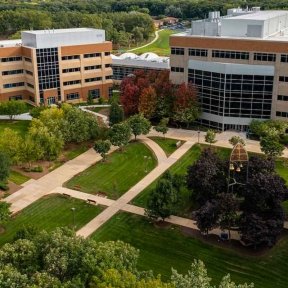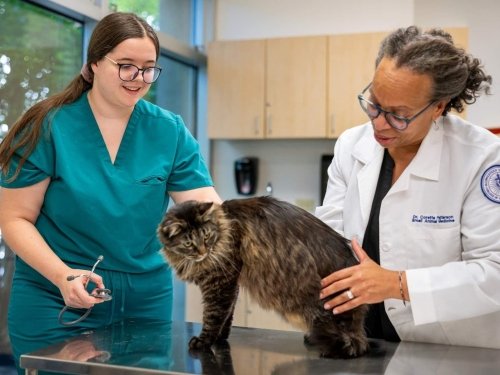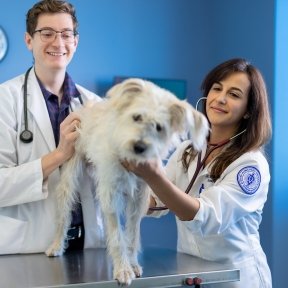Veterinary Medicine
The College of Veterinary Medicine will teach you about the wide range of opportunities available in veterinary healthcare. Our state-of-the-art facilities and emphasis on hands-on learning will help you build a career to benefit humans and animals alike.

AZ - Glendale
- In-Person
College College of Veterinary Medicine (AZ)
Duration4 years
Class Size Approximation130

IL - Downers Grove
- In-Person
College Chicago College of Veterinary Medicine
Duration4 years
Class Size Approximation130
The Midwestern Advantage
Midwestern University's investment in education, faculty, research, facilities, and clinical training translates into our students being "Day One Ready.”
The College of Veterinary Medicine will introduce you to the exciting world of innovative veterinary healthcare. CVM faculty and students work together in the spirit of One Health, the synthesis of human and animal healthcare. Your education will be strengthened by interaction with Midwestern University's diverse programs and faculty, and you will learn about the wide range of opportunities available in veterinary healthcare that benefit humans and animals alike. With our state-of-the-art facilities and emphasis on hands-on learning, we will help you build a career as a compassionate and patient-centered member of tomorrow's healthcare team.
View program details in our Academic Catalog*
*Subject to change
NAVLE Pass Rate: 92%* for the College of Veterinary Medicine, Glendale Campus, Class of 2025
*Compared to the 80% pass rate required by the AVMA Council on Education
Many exciting opportunities exist in veterinary medicine. Veterinarians can work in small, large, or mixed-animal general primary care practice or a specialty field such as: anesthesiology, dentistry, cardiology, food animal production medicine, internal medicine, surgery, wildlife medicine, and many more. Other career opportunities include working in biomedical research, veterinary medical education, diagnostic laboratories, regulatory medicine, public health, industry, or biosecurity.
At Midwestern University, we prioritize research to advance knowledge and offer students enhanced learning opportunities, fostering close collaboration with faculty researchers and peers on innovative projects.
Your gift to Arizona's only College of Veterinary Medicine can have far-reaching impact which will benefit the veterinary students we teach and the animals we treat. To learn more about our giving opportunities, ways to give, and giving societies, please contact the Office of Development and Alumni Relations at 623-572-3784 or azdevelopment@midwestern.edu.
Mobile Unit Fund
Your donation will help purchase medicine and supplies needed for our students and faculty who are providing basic medical care, as well as spay and neuter surgeries, for dogs and cats in underserved areas of our state.
Student Surgical Laboratory Fund
A gift to the Student Surgical Laboratory Fund will help our students gain hands-on supervised surgical experience to provide free spay and neuter surgeries along with supplementary medical care for animals sent to Midwestern University College of Veterinary Medicine's student surgical laboratories from a variety of local rescue shelters.
Patient Assistance Fund
Through your support, we will provide care for animals whose owners are unable to cover the cost of care for their beloved pets.
Companion Animal Memorial Fund
Your gift made in memory of a cherished animal friend will be used to benefit the general scholarship fund.
Grateful Client Fund
A donation to the Grateful Client Fund will recognize the high-quality, compassionate care you and your pet received. You may recognize a specific person or a whole service area and funds support the general scholarship fund.
Establish Your Own Named Endowed Scholarship
Endowed scholarships are designed to be permanent and perpetual and can be created with gifts totaling a minimum amount of $25,000, contributed in full at the outset or with an initial commitment that is added to over time until the endowment level of $25,000 is attained. The principal of the fund is invested to produce income, and an annual award is made to a student/s. The principal remains untouched, so the endowment can last into perpetuity.
Academic Course Catalog
Explore comprehensive details about our academic programs (subject to change). Illinois course information will be available soon.
Career Placement & Salaries
The starting salary a new D.V.M. graduate earns is dependent upon the area of veterinary medicine they enter.
Learn More About our On Campus Clinical Experiences
Explore Clinical Opportunities through our Veterinary Teaching Hospital
At our Companion Animal Clinic, Large Animal Clinic, and Diagnostic Pathology Center you will have valuable hands-on experience within walking distance of campus.
Campus Options


Glendale
Located just 15 minutes from downtown Phoenix. Students can study and live on our sprawling 143-acre campus and practice at our University-owned clinics located just across the street.


Downers Grove
Located just 25 miles west of Chicago. Students can study and live in the comfort and safety of a 105-acre campus in the suburbs and can practice at our University-owned clinics located just 10 minutes away.


